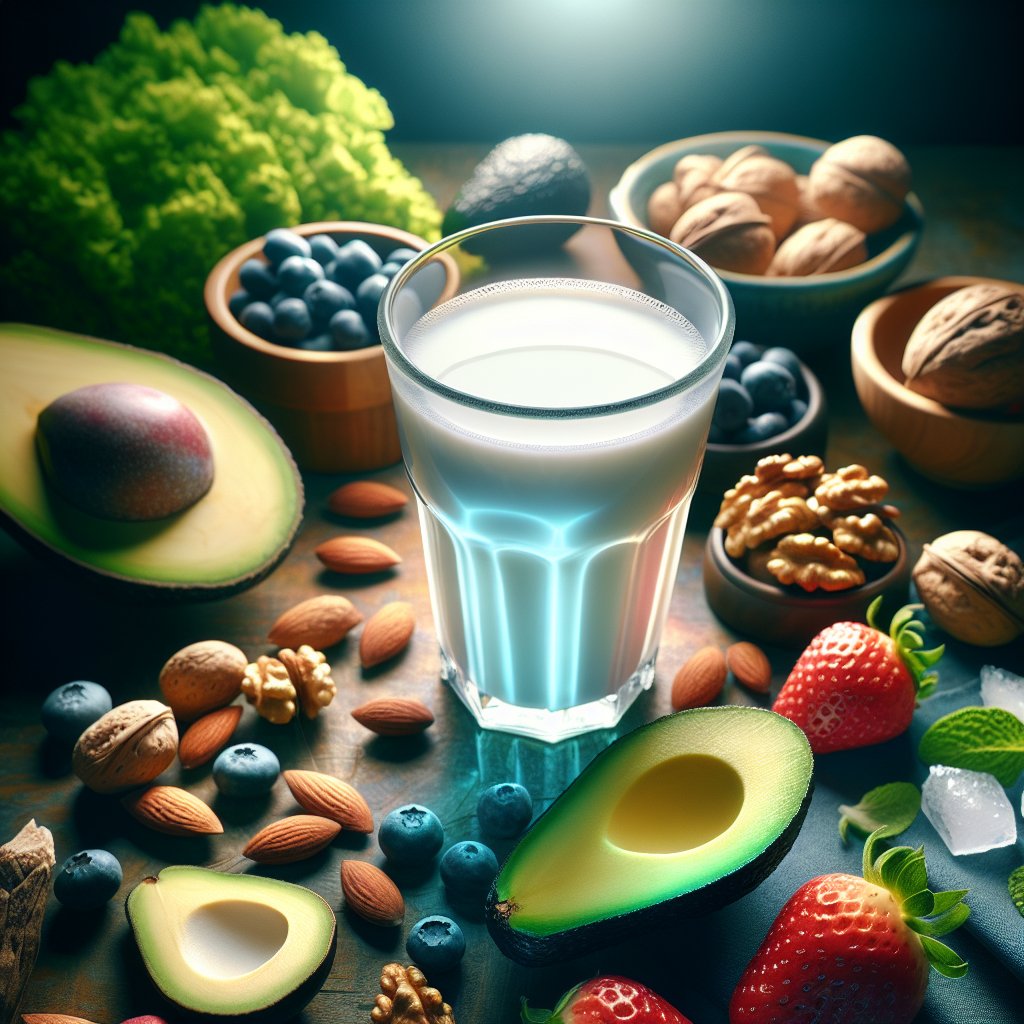Discover the Secret to Keto Success with Lactose-Free Milk: The Ultimate Guide to Navigating the Keto Diet with Lactose-Free Milk
Unveiling the Phenomenon of the Ketogenic Diet and the Growing Desire for Lactose-Free Products
Welcome, keto enthusiasts! Today, we’re delving into the fascinating world of the ketogenic diet and the increasing demand for lactose-free products, particularly lactose-free milk. The ketogenic diet has taken the health and wellness world by storm, with its remarkable impact on weight management, cognitive function, and energy levels. Simultaneously, the demand for lactose-free alternatives has surged, catering to the dietary preferences and intolerances of many individuals. Let’s unravel the reasons behind this dual phenomenon and explore the nitty-gritty of integrating lactose-free milk into your keto journey.
If you’ve been pondering the reasons behind the skyrocketing popularity of the ketogenic diet, you’re not alone. This low-carb, high-fat dietary approach has gained immense traction due to its proven ability to induce ketosis, a metabolic state where the body proficiently burns fat for fuel, leading to weight loss and enhanced vitality. Beyond shedding extra pounds, followers of the ketogenic diet often report improved mental clarity, stabilized blood sugar levels, and increased overall well-being.
Simultaneously, the demand for lactose-free products, especially lactose-free milk, has witnessed a notable upsurge. Scientific studies have shown that a significant portion of the global population experiences lactose intolerance to varying degrees, leading to digestive discomfort after consuming dairy products. In response to this, the market for lactose-free alternatives has expanded exponentially, aligning with the growing consumer preference for gut-friendly, easily digestible options.

What is Lactose-Free Milk?
If you’re someone who loves milk but has trouble digesting lactose, you’ll be pleased to discover the wonders of lactose-free milk. This alternative is produced by removing the lactase enzyme from regular cow’s milk, making it more suitable for individuals with lactose intolerance or those following a keto diet.
Essentially, lactose-free milk contains all the essential nutrients found in regular cow’s milk, such as calcium, vitamin D, and protein, without the lactose component. This means you can still enjoy your favorite milk-based dishes without experiencing the discomfort often associated with lactose digestion.
The Benefits of Lactose-Free Milk for Individuals with Lactose Intolerance
For individuals with lactose intolerance, lactose-free milk is a game-changer. Research has shown that around 65% of the human population has a reduced ability to digest lactose after infancy. With lactose-free milk, those who were previously unable to consume milk due to digestive issues can now enjoy the nutritional benefits without the discomfort.
A study published in the “Nutrition Journal” found that lactose-free milk helped improve mineral absorption in lactose-intolerant individuals, making it an excellent alternative for maintaining bone health and overall well-being.
Lactose-Free Milk and the Keto Diet
If you’re following a keto diet, lactose-free milk can be an invaluable addition to your kitchen. While regular milk contains natural sugars like lactose, which can impede ketosis, lactose-free milk provides a keto-friendly alternative. This is especially beneficial if you’re looking to manage your carb intake while still enjoying dairy products.
One cup of lactose-free milk contains around 13 grams of fat, 8 grams of protein, and just 3 grams of carbohydrates, making it a suitable option for those aiming to stay within their daily carb limits while reaping the nutritional benefits of milk.
Moreover, a study published in the “Journal of Nutrition and Metabolism” highlighted that individuals following a low-carb, high-fat diet (similar to the keto diet) who consumed lactose-free milk experienced improved lipid profiles and better weight management compared to those consuming regular milk.
It’s evident that incorporating lactose-free milk into your keto lifestyle can have numerous advantages, from supporting your nutritional needs without compromising ketosis to aiding in weight management and overall well-being.
Nutritional Value of Lactose-Free Milk
When it comes to the ketogenic diet, understanding the nutritional value of the food and drinks you consume is essential. Lactose-free milk, a popular alternative for individuals with lactose intolerance, is gaining attention in the keto community. Let’s explore the key nutrients found in lactose-free milk and compare it to regular milk in terms of carbohydrates and fat content.
Key Nutrients in Lactose-Free Milk
Lactose-free milk is a rich source of essential nutrients that are beneficial for overall health. It provides high-quality protein, calcium, phosphorus, potassium, and vitamins like A, D, and B12. These nutrients are essential for maintaining bone health, supporting the immune system, and promoting muscle function.
Additionally, lactose-free milk is often fortified with vitamins and minerals to further enhance its nutritional value, making it a wholesome choice for individuals following a ketogenic lifestyle.
Comparison to Regular Milk
When comparing lactose-free milk to regular milk in terms of carbohydrates and fat content, the difference lies in the presence of lactose. Regular cow’s milk contains naturally occurring milk sugar, lactose, which contributes to its carbohydrate content. On the other hand, lactose-free milk is treated with the lactase enzyme to break down lactose into simpler sugars, primarily glucose and galactose.
This enzymatic process reduces the carbohydrate content of lactose-free milk, making it a suitable option for individuals looking to minimize their carbohydrate intake while following a ketogenic diet.
Furthermore, the fat content in both regular and lactose-free milk can vary depending on the specific product. However, it’s important to note that full-fat versions of both types of milk can be included in a keto diet due to their high-fat content and low carbohydrate count.
By understanding the nutritional differences between lactose-free and regular milk, individuals can make informed choices that align with their keto goals while ensuring they meet their daily nutrient requirements.
Keto-Friendly Aspects of Lactose-Free Milk
When it comes to maintaining a ketogenic lifestyle, finding suitable dairy options can be a challenge. Traditional cow’s milk is relatively high in lactose, a form of natural sugar found in dairy products. However, lactose-free milk presents an excellent solution, especially for individuals with lactose sensitivities.
Lactose-free milk is low in carbohydrates, which is a key factor in the ketogenic diet. Research published in the Journal of Food Science has shown that lactose-free milk contains no more than 1-2 grams of carbohydrates per cup, making it a keto-friendly choice. This low carbohydrate content helps individuals maintain a state of ketosis, where the body burns fat for fuel instead of carbohydrates.
Moreover, as noted in a study by the American Journal of Clinical Nutrition, lactose-free milk provides essential nutrients such as calcium, vitamin D, and protein, all of which are crucial for overall health and wellbeing on a ketogenic diet. These nutrients support bone health, immune function, and muscle maintenance without compromising ketosis.
For those with lactose intolerance or sensitivity, lactose-free milk offers a way to enjoy the benefits of dairy without the discomfort. The lactase enzyme added to lactose-free milk breaks down the lactose, making it easier to digest.
With its low carbohydrate content and suitability for individuals with lactose sensitivities, lactose-free milk seamlessly aligns with the principles of the ketogenic diet, providing a convenient option for those seeking to maintain ketosis without sacrificing essential nutrients.

Health Benefits of Lactose-Free Milk on Keto
When it comes to following a ketogenic diet, it’s essential to choose the right dairy products that align with your nutritional goals. Lactose-free milk is a fantastic option for those on a keto journey, offering several advantages that contribute to overall well-being.
Weight Loss Support
Incorporating lactose-free milk into your keto lifestyle can aid in weight loss. A study published in the American Journal of Clinical Nutrition found that the consumption of dairy products, such as lactose-free milk, is associated with a lower body weight and reduced body fat percentage. The high protein content in lactose-free milk also promotes satiety, making you feel fuller for longer, which can ultimately lead to decreased calorie intake and support weight management on a ketogenic diet.
Improving Digestive Health
For individuals with lactose intolerance, consuming regular milk can lead to digestive discomfort. However, lactose-free milk provides a solution by offering the same nutritional benefits without the unwanted digestive issues. Research published in the Journal of Nutrition suggests that lactose-free milk can help improve digestive health by reducing symptoms associated with lactose intolerance, such as bloating, gas, and diarrhea.
By incorporating lactose-free milk into your ketogenic diet, you can enjoy the health benefits of dairy without compromising your digestive wellness. Whether you use it in your morning coffee, protein shakes, or keto-friendly recipes, lactose-free milk can be a valuable addition to your daily routine.
Choosing the Right Lactose-Free Milk for Keto Diet
When it comes to following a ketogenic diet, choosing the right lactose-free milk is crucial. Not all lactose-free milks are created equal, and as a keto enthusiast, you want to ensure that your milk aligns with the high-fat, low-carb principles of the diet. Let’s dive into how you can select the best lactose-free milk options based on fat content, added sugars, and quality.
Fat Content
One of the key components of a keto diet is the consumption of healthy fats. When selecting a lactose-free milk for your keto lifestyle, opt for full-fat options such as coconut milk, almond milk, or macadamia nut milk. These choices are high in healthy fats, which can support ketosis and keep you feeling satiated.
Added Sugars
Be mindful of added sugars when choosing lactose-free milk for your keto journey. Some commercial brands may add sweeteners to improve the taste of the milk, but these can contribute to an increase in carb intake, which is not ideal for ketosis. Always check the nutrition label and opt for unsweetened varieties to avoid hidden sugars.
Quality
Opt for high-quality lactose-free milk options that are free from preservatives and additives. Look for labels that indicate minimal processing and organic ingredients. High-quality milk not only offers better taste but also ensures that you’re consuming a product that aligns with the wholesome principles of the ketogenic diet.
By prioritizing high-fat content, avoiding added sugars, and opting for quality lactose-free milk options, you can seamlessly integrate milk into your keto lifestyle.
Now that you’re equipped with the knowledge of choosing the best lactose-free milk for keto, let’s explore some delicious keto-friendly recipes that incorporate this versatile ingredient.
Incorporating Lactose-Free Milk into Keto Recipes
<p>
If you're following a ketogenic diet and looking for a versatile ingredient to elevate your favorite recipes, lactose-free milk may just be the secret weapon you've been searching for. This dairy alternative is not only perfect for those with lactose intolerance but can also be incredibly beneficial for anyone looking to reduce their carbohydrate intake. Let's explore some creative ways to incorporate lactose-free milk into your keto-friendly recipes for smoothies, coffee, and baking.
</p>
<h3> Keto-Friendly Smoothies </h3>
<p>
Smoothies are a fantastic way to kick-start your day or refuel after a workout. Using lactose-free milk as the base for your keto smoothies adds a creamy texture without the added carbs. Try blending it with low-carb fruits like berries, avocados, and spinach, along with a scoop of your favorite keto-friendly protein powder for a delicious and energizing treat.
</p>
<h3> Creamy Keto Coffee </h3>
<p>
If you're a coffee lover, you'll be thrilled to learn that lactose-free milk can be a game-changer in your morning cup of joe. Whether you prefer an iced coffee or a cozy latte, substituting regular milk with its lactose-free counterpart ensures that you can enjoy a creamy, indulgent coffee experience without derailing your keto goals.
</p>
<h3> Baking with Lactose-Free Milk </h3>
<p>
Baking on a keto diet can be a bit challenging, but with the addition of lactose-free milk, you open up a world of possibilities. From keto-friendly pancakes and muffins to creamy sauces and custards, this dairy alternative can seamlessly replace regular milk in your favorite baking recipes, keeping them low in carbs and high in flavor.
</p>

Potential Drawbacks of Lactose-Free Milk on Keto
While lactose-free milk can be a valuable addition to a ketogenic diet, there are some potential drawbacks to consider, such as hidden additives and pricing.
Hidden Additives
Some brands of lactose-free milk may contain added sugars, thickeners, or stabilizers to improve taste and texture. It’s essential to read the labels carefully when choosing lactose-free milk for your keto lifestyle. Look for options with minimal ingredients and no added sugars to ensure that you’re not unknowingly consuming additional carbs that could hinder your ketosis.
Additionally, some individuals may be sensitive to certain additives, so being mindful of the ingredients in lactose-free milk can help prevent any adverse reactions.
Pricing
Another potential drawback of lactose-free milk is the pricing. In some cases, lactose-free milk can be more expensive than regular milk or other dairy alternatives. This can impact the budget of individuals following a ketogenic diet, especially if they consume lactose-free milk regularly.
However, with the increasing popularity of the ketogenic diet and the growing demand for lactose-free options, more affordable alternatives are becoming available. It’s worth exploring different brands and stores to find competitively priced lactose-free milk that fits within your budget.
Despite these potential drawbacks, with careful label reading and budget-conscious shopping, lactose-free milk can still be a valuable asset for those following a ketogenic lifestyle.
Summarizing the Benefits of Lactose-Free Milk for Keto Lifestyle
As we conclude our ultimate guide to navigating the keto diet with lactose-free milk, it’s essential to recap the significant benefits of incorporating this dairy alternative into your ketogenic lifestyle.
Rich in Healthy Fats
Lactose-free milk is a fantastic source of healthy fats, making it an ideal addition to a keto diet. These fats contribute to feelings of fullness and satisfaction, which can help with managing appetite and cravings while following a low-carb, high-fat eating plan.
Low in Carbohydrates
Carbohydrates can quickly derail ketosis, the metabolic state crucial for the success of a keto diet. Lactose-free milk contains minimal carbohydrates, making it a keto-friendly choice that won’t compromise your carb limits.
Protein-Packed
Protein is essential for muscle repair and growth, and lactose-free milk offers a significant protein content. This makes it an excellent option for individuals following a ketogenic diet, as protein plays a crucial role in overall health and well-being.
Enhances Nutrient Intake
Lactose-free milk is often fortified with essential nutrients such as vitamins A, D, and calcium. These nutrients are vital for bone health, immune function, and overall well-being, making lactose-free milk a valuable addition to a keto lifestyle.
Digestive Friendly
For individuals sensitive to lactose, or those following a dairy-free keto diet, lactose-free milk provides a digestively friendly alternative. It allows you to enjoy the creamy texture and taste of milk without discomfort or digestive issues, making it easier to adhere to your keto journey.
Versatile in Recipes
Whether you’re whipping up a keto-friendly smoothie, incorporating lactose-free milk into your morning coffee, or using it as a base for creamy keto soups and sauces, this dairy alternative offers versatility in an array of delicious keto recipes.
By leveraging the benefits of lactose-free milk within the context of a keto diet, individuals can make informed, health-conscious choices while keeping their tastebuds satisfied.
So, go ahead, embrace the goodness of lactose-free milk, and elevate your keto experience with this enriching and nutritious dairy alternative.


